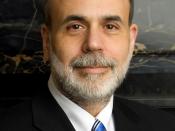When times are good everyone trusts the word of the chairman of the Federal Reserve. During the boom of the beginning of this decade the word of Alan Greenspan was golden. The old adage "if it aint broke, don't fix it" seemed to apply to the reappointment of Alan Greenspan at each election season. Even when a democratic president left office, he was reappointed by the incoming Republican president rather than being replaced by a republican counterpart. Alan Greenspan controlled the economy during the booming 90's into the declining economy of the early 00's. His term from 1987 to 2006 is truly unprecedented. He had his finger on the pulse of the economy from the beginnings of the dot-com boom into the post 9-11 world. He maintained most of his control of the economy implementing his practice of "inflation targeting".
Inflation targeting is a monetary policy tool in which Greenspan would attempt to control the rate of inflation.
The Federal Reserve would release to the public a predicted rate of inflation which would be best to grow the economy at a steady rate. If the rate of inflation was growing too quickly, the Federal Reserve would raise the short-term interest rates. This raise in short-term interest rates would control the money supply or Aggregate Supply of Funding. This would conceivably slow the economy and the rate of inflation.
This tactic would be reversed if the economy was growing to slowly or was in recession. The Federal Reserve would then lower short-term rates thus increasing the availability of money. There are complex formulas which seem to solidify these monetary policies but not everyone agrees that they are effective.
From my own experiences I remember being unemployed during the collapse of the dot-com bubble. I remember praying for my family that the...


